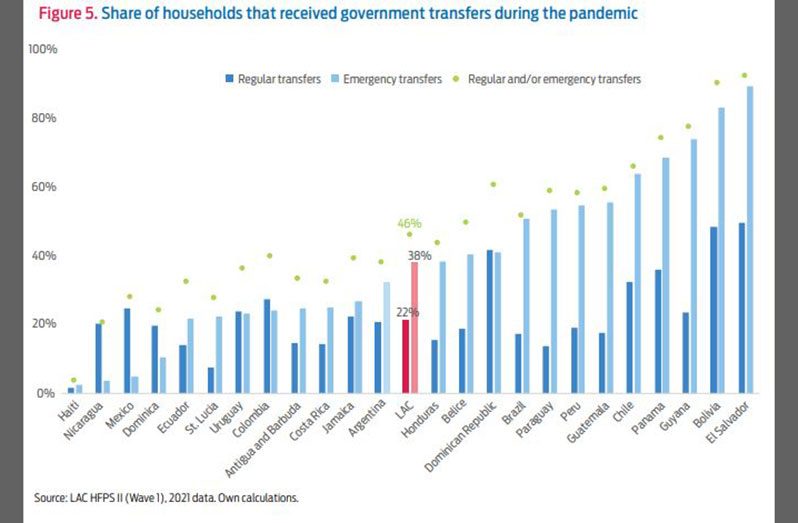HOUSEHOLDS in Guyana have benefitted from government cash transfers more than the vast majority of countries in Latin America and the Caribbean, a World Bank and the United Nation Development Programme (UNDP) report has disclosed.
The report, which is the results of a regional survey titled: “An Uneven Recovery: the Impact of COVID-19 on Latin America and the Caribbean”, pointed out that close to 80 per cent of Guyanese households have benefitted from either regular or emergency cash transfers during the pandemic.
According to the report, only households in Bolivia and El Salvador have benefitted more than households in Guyana with Haiti at the bottom of the list with around three per cent.
Since the People’s Progressive Party/Civic Government came to office some 16 months ago, it has taken a series of steps to cushion the impact of the pandemic and enhance the lives of Guyanese.
Recently, the government announced that $400 million has been set aside for a special 2021 payout to frontline workers in the health sector who have endured challenging circumstances, as they provided healthcare at the height of the COVID-19 pandemic.
A COVID-19 cash grant of $25,000 per household was also granted, resulting in the distribution of over $7.5 billion to families across all 10 of the country’s administrative regions.
Frontline workers in the health sector and the Disciplined Services also received year-end bonuses totalling $1 billion in December 2020. All public sector employees received a one-off payment of $25,000 in December 2020, totalling $2 billion.
The monthly old-age pension was increased from $20,500 to $25,000, amounting to a total annual benefit of $4 billion for the elderly.
The government increased public assistance by 33 per cent, from $9,000 to $12,000, handing over an additional $500 million annually.
In August 2021, the government announced measures to provide a one-off grant of $25,000 to old-age pensioners, public assistance recipients, and persons living with disabilities, benefitting some 90,000 persons to the tune of $2.2 billion. It also purchased $200 million of electricity credits for the most vulnerable households.
The Because We Care cash grant, which was taken away from public school children by the previous administration, was restored and increased to $19,000, and extended to private schoolchildren, amounting to an injection of $3.6 billion to help them get back to school.



.jpg)











